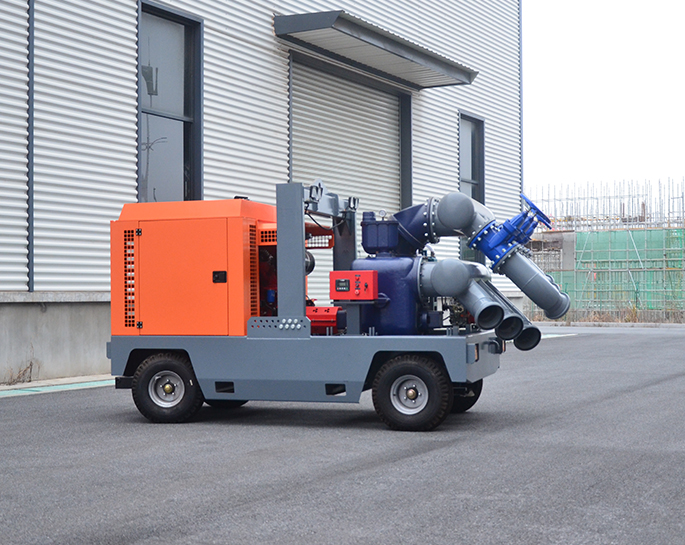What factors affect the performance of a mobile pump truck?
Jun 04, 2024
Share:
The performance of a mobile pump truck is influenced by a variety of factors, which can be broadly categorized into technical, operational, environmental, and maintenance aspects. Here are the key factors:
### Technical Factors
1. **Pump Capacity and Power**:
- The horsepower and capacity of the pump directly affect the flow rate and pressure it can achieve.
- Type of pump (e.g., centrifugal, positive displacement) impacts efficiency and suitability for specific applications.
2. **Engine Power**:
- The engine's power determines the overall ability to drive the pump and other systems on the truck.
3. **Pump and Piping Design**:
- The design and diameter of the piping influence the flow rate and pressure.
- Efficiency of the pump design affects energy consumption and performance.
4. **Hose and Nozzle Specifications**:
- Length and diameter of hoses can affect pressure and flow rate.
- Nozzle type and size also influence the efficiency and reach of the pumped material.
5. **Hydraulic System Efficiency**:
- Efficiency and reliability of the hydraulic system impact the overall performance of the pump.
### Operational Factors
1. **Operator Skill and Experience**:
- Skilled operators can optimize the performance by adjusting parameters and responding to changing conditions.
2. **Load and Material Characteristics**:
- The nature of the material being pumped (viscosity, abrasiveness, particle size) can affect pump efficiency and wear.
3. **Operating Conditions**:
- Conditions like start-stop operations, continuous duty, or intermittent use influence wear and performance.
### Environmental Factors
1. **Weather Conditions**:
- Temperature extremes, humidity, and precipitation can impact the operation and efficiency of both the engine and pump.
2. **Site Conditions**:
- Terrain, accessibility, and the stability of the ground where the pump truck is operating can affect performance.
3. **Altitude**:
- Higher altitudes can reduce engine and pump performance due to lower air density and oxygen levels.
### Maintenance Factors
1. **Regular Maintenance and Servicing**:
- Timely and thorough maintenance ensures optimal performance and longevity of the pump and engine.
2. **Wear and Tear**:
- Regular inspection and replacement of worn components, such as seals, gaskets, and bearings, are crucial.
3. **Quality of Spare Parts**:
- Using high-quality, compatible spare parts ensures better performance and reduces downtime.
### Additional Considerations
1. **Fuel Quality**:
- Quality of fuel used can affect engine performance and longevity.
2. **Lubricants and Fluids**:
- Proper selection and regular replacement of lubricants and hydraulic fluids maintain system efficiency.
3. **Regulatory Compliance**:
- Adhering to safety and environmental regulations can impact operational procedures and, consequently, performance.
By considering and optimizing these factors, the performance of a mobile pump truck can be significantly enhanced, ensuring efficient and reliable operation under various conditions.

### Technical Factors
1. **Pump Capacity and Power**:
- The horsepower and capacity of the pump directly affect the flow rate and pressure it can achieve.
- Type of pump (e.g., centrifugal, positive displacement) impacts efficiency and suitability for specific applications.
2. **Engine Power**:
- The engine's power determines the overall ability to drive the pump and other systems on the truck.
3. **Pump and Piping Design**:
- The design and diameter of the piping influence the flow rate and pressure.
- Efficiency of the pump design affects energy consumption and performance.
4. **Hose and Nozzle Specifications**:
- Length and diameter of hoses can affect pressure and flow rate.
- Nozzle type and size also influence the efficiency and reach of the pumped material.
5. **Hydraulic System Efficiency**:
- Efficiency and reliability of the hydraulic system impact the overall performance of the pump.
### Operational Factors
1. **Operator Skill and Experience**:
- Skilled operators can optimize the performance by adjusting parameters and responding to changing conditions.
2. **Load and Material Characteristics**:
- The nature of the material being pumped (viscosity, abrasiveness, particle size) can affect pump efficiency and wear.
3. **Operating Conditions**:
- Conditions like start-stop operations, continuous duty, or intermittent use influence wear and performance.
### Environmental Factors
1. **Weather Conditions**:
- Temperature extremes, humidity, and precipitation can impact the operation and efficiency of both the engine and pump.
2. **Site Conditions**:
- Terrain, accessibility, and the stability of the ground where the pump truck is operating can affect performance.
3. **Altitude**:
- Higher altitudes can reduce engine and pump performance due to lower air density and oxygen levels.
### Maintenance Factors
1. **Regular Maintenance and Servicing**:
- Timely and thorough maintenance ensures optimal performance and longevity of the pump and engine.
2. **Wear and Tear**:
- Regular inspection and replacement of worn components, such as seals, gaskets, and bearings, are crucial.
3. **Quality of Spare Parts**:
- Using high-quality, compatible spare parts ensures better performance and reduces downtime.
### Additional Considerations
1. **Fuel Quality**:
- Quality of fuel used can affect engine performance and longevity.
2. **Lubricants and Fluids**:
- Proper selection and regular replacement of lubricants and hydraulic fluids maintain system efficiency.
3. **Regulatory Compliance**:
- Adhering to safety and environmental regulations can impact operational procedures and, consequently, performance.
By considering and optimizing these factors, the performance of a mobile pump truck can be significantly enhanced, ensuring efficient and reliable operation under various conditions.


.png)
.png)

.png)


